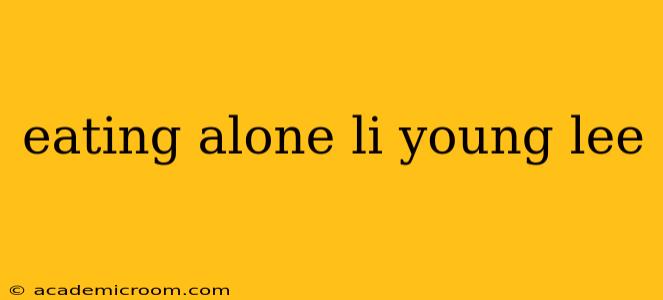Li-Young Lee's "Eating Alone" is a deceptively simple poem that resonates deeply with readers on a visceral level. It's a meditation on solitude, memory, loss, and the enduring power of connection, even in the face of profound absence. More than just a description of a solitary meal, it's a poignant exploration of the human condition and the complexities of grief and remembrance. This analysis will delve into the poem's intricacies, exploring its themes and techniques to reveal the depth of Lee's artistry.
What is the main theme of Li-Young Lee's poem "Eating Alone"?
The central theme of "Eating Alone" is the bittersweet experience of solitude. While physically alone, the speaker is deeply connected to the memories and presence of loved ones, particularly his deceased father. The poem subtly reveals the ongoing impact of loss and the ways in which memory shapes the present moment. It's not simply about the act of eating; it's about the emotional landscape that surrounds this seemingly ordinary action. The loneliness is palpable, yet the poem avoids sentimentality by focusing on concrete details and sensory experiences.
What are the important symbols in Li-Young Lee's "Eating Alone"?
Several powerful symbols contribute to the poem's emotional depth:
-
The food itself: The simple act of eating becomes a ritualistic act, imbued with significance. The specific descriptions of the food—the "pale rice," the "broth," the "single plum"—suggest a meager meal, reflecting the speaker's emotional state. The paucity of food mirrors the emptiness the speaker feels in the absence of his father.
-
The setting: The setting of the poem, a simple table, amplifies the feeling of isolation. The lack of other people emphasizes the speaker's loneliness.
-
The father's absence: The most significant symbol is the absent father. His presence is felt throughout the poem, even though he is not physically present. The memories associated with him, like the shared meals, linger in the speaker's mind, creating a poignant sense of loss.
What does the last line of Li-Young Lee's poem, "Eating Alone," mean?
The concluding line, "And I eat alone," is not merely a statement of fact but a powerful affirmation of the speaker's enduring solitude. The repetition emphasizes the weight of his isolation, yet the simplicity of the statement underscores the universality of the human experience of loneliness and loss. The finality of the statement leaves the reader contemplating the lingering sadness and the complexities of memory and grief.
What is the tone of Li-Young Lee's poem "Eating Alone"?
The tone of "Eating Alone" is one of quiet melancholy. It avoids excessive emotional expression, instead relying on carefully chosen details to convey a sense of profound sadness and longing. The poem’s understated tone is effective in intensifying the emotion, allowing the reader to experience the speaker's grief intimately.
What literary devices are used in Li-Young Lee's "Eating Alone"?
Lee masterfully employs several literary devices to create the poem's impact:
-
Imagery: The poem is rich with sensory details, creating a vivid picture of the speaker's experience. The imagery of the food, the setting, and the memories serve to deepen the poem's emotional impact.
-
Repetition: The repetition of "And I eat alone" emphasizes the speaker's isolation and serves to highlight the cyclical nature of grief.
-
Simplicity: The poem's simple language and structure belies the complexity of its themes. The understated style enhances the poem's emotional power.
In conclusion, Li-Young Lee's "Eating Alone" is a powerful exploration of solitude, memory, and loss. Through its carefully chosen imagery, simple structure, and understated tone, the poem creates a lasting impression on the reader, reminding us of the profound impact of absence and the enduring power of connection, even in the face of grief. The poem's enduring appeal lies in its universality—the experience of solitude and loss is a shared human experience, and Lee masterfully captures its nuances and complexities.
